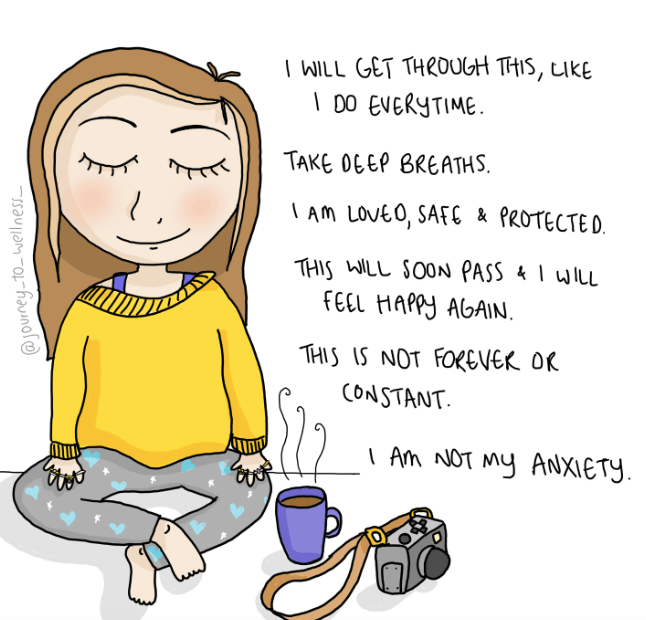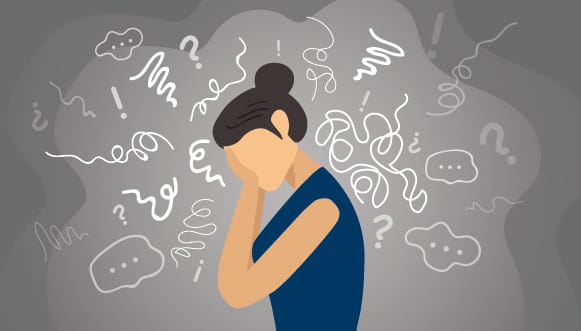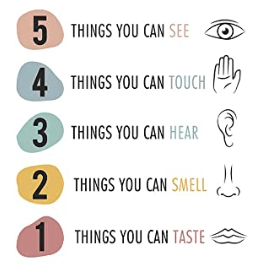These are activities or strategies you can do to handle tough situations or emotions. These help you calm down and feel better.
What are ...
COPING SKILLS
This helps our brains recover and repair, which is why it's so important for our mental health. It helps maintain cognitive skills, such as attention, learning, and memory!
What is...
SLEEP
Name this mental health practice:

What is...
PRACTICING AFFIRMATIONS
This mental illness is defined as having an intense, excessive, and persistent worry and fear about everyday situations. It brings feelings of dread or uneasiness.
What is ...
ANXIETY
Your friend Alex is feeling very anxious, what coping tool would you suggest for Alex to try to help them feel better?
Possible answers: Deep, controlled breathing, grounding exercise, mindfulness, meditation, journaling, talking with a therapist, etc.
Name 3 coping or regulation tools.
What are ...
Meditation, mindfulness, art, journaling, exercise, reading, talking to a friend, etc.
This is a practice of taking an active role in protecting one's own well-being and happiness, particularly during periods of stress.
What is ...
SELF-CARE
Name this mental health practice:

What is...
POSITIVE SELF-TALK
What are ...
FEELINGS
A friend comes to you because they had a really tough day and are feeling low. What would you do to help them feel better?
LISTEN without judgement, VALIDATE, COPING SKILLS, ENCOURAGE them to make positive changes.
And if they need more support, help them with local resources that can help them.
This is when you pay attention to what's happening in the present moment. When you do this activity you focus on what you can see, hear, feel, and smell right now.
What is ...
MINDFULNESS
When we practice mindfulness, it can help us feel more calm and focused. It can also help us enjoy things more fully instead getting distracted by other things like thoughts or worries about the past or future.
This activity can produce endorphins—chemicals in the brain that boost our mood and support regulation. It can also improve the ability to sleep, which in turn reduces stress.
What is...
EXERCISE
What is this mental health practice?

What is...
PRACTICING GRATITUDE or A GRATITUDE JOURNAL
A state of physical, emotional, and mental exhaustion caused by long term involvement in emotionally demanding situations.
What is ...
BURNOUT
Jodie has trouble sleeping at night. What are 3 things you can recommend to Jodie to help her sleep better?
- exercising during the day to expel excess energy
- listening to relaxing music, sleep playlists, brown noise
- staying off phone before bed (avoiding blue light)
- reading or journaling before bed to clear mind
- meditating before bed
SHOW ME a breathing technique to calm down, dispel anxiety, or regulate back to baseline
Triangle breathing, pizza breath, box breathing, deep breathing, etc.
Breathing deeply is a helpful way to start the day, keep us feeling good, calm us down or help us feel better and relax. It can help relieve tension and stress in the body.
True or False
Self-care is different from person to person.
What is ...
TRUE
Name this mental health practice:

What is...
GROUNDING TECHNIQUE or PRACTICING MINDFULNESS
This is the part of the brain that is responsible for anxiety.
When it senses trouble, it sounds the alarms for the body to release cortisol (stress hormone) and adrenaline to fight off real or perceived danger.
What is...
THE AMYGDALA

Anna struggles with low self confidence and social anxiety. She is nervous to go to new places and meet new people.
What is one strategy Anna could try using to improve her self confidence?
Practicing affirmations, post it affirmations on her mirror, positive self-talk, journaling, making a list of her strengths, getting out of her comfort zone more often to challenge her abilities and thoughts.
Name 5 strategies that can be use for emotional regulation.
Go for a walk, take a break, play with fidgets, art, listen to music, journal, go to a calm down spot, take deep breaths, count down from 10, grounding techniques, distract yourself, etc.
Name two ways to prevent burn out.
What is...
Taking breaks regularly, setting boundaries, leaving work related items at work, practicing self-care, making time for family/friends, doing things you enjoy for you, being able to recognize the early signs of exhaustion/burn out, etc.
Understanding how others feel by putting yourself in their shoes.
What is ...
EMPATHY
Positive self talk, keeping a gratitude list, and practicing perseverance are examples of what?
What is ...
RESILIENCE
You have been working hard to manage and complete tasks and responsibilities - managing your families extra-curricular commitments, creating fun and engaging lessons for your students, managing your home (cleaning/laundry/meals). You are exhausted and excited for the weekend to do some self-care and rest. Suddenly, your friend calls you to ask you if you could help them prepare the decorations, cake, and supplies for their child's birthday party. You really want to say yes to helping, but also know that you need this time to yourself.
What can you do?
Set boundaries, say no, explain that your plate is full, etc.
Boundaries help us to meet our own needs, help develop our identity and independence, help build healthy relationships, is respectful of others and enables us to use our energy in good ways to take care of ourselves.